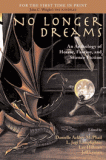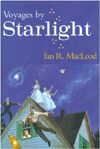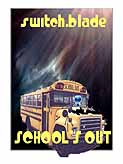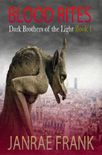
Triangulation: Dark Glass, edited by Pete Butler
Book Review by Joshua Palmatier
Have you read this book?
This is the first time I've ever read, let alone reviewed, an anthology published by a small press. I have to say the experience was interesting. I thought that the stories had much more of an edge to them regarding originality of story concepts, the authors playing with ideas that weren't as standard or as accepted in the mainstream, such as different types of POV characters, or worlds that were leaning farther away from our own than usual. For this reason alone, I think I'll continue reading small press anthologies when I get the chance. For fantasy and science fiction, it's often the idea that makes the world cool, so pushing the envelope is definitely a good thing. So why are these stories published in the small press and not the mainstream? Well, I can't say for sure. I don't know whether the authors submitted these stories to the mainstream for one. I thought a few of these stories probably could have made it in larger press anthologies if they'd found the right editor at the right moment. But I also think that one of the harder things to do when you push the envelope is to make the new, cool idea as fully fleshed out as possible. As you'll see, there were a few stories in there where I thought the idea rocked, but the story needed... something more, whether that was more development of the world, or more space to flesh out the characters, or what, it needed another push, another rewrite, or some more thought by the author. Perhaps with that extra time, work, or thought, the story could be published in the mainstream.
But that doesn't detract from the fact that the entire anthology was enjoyable. I've highlighted my favorite stories in the anthology, although overall I liked them all. And as I said, I'll certainly be checking out more small press anthologies in the future. You should, too.
Table of Contents:
The Milton Feinhoff Problem by Mark Onspaugh: This was in interesting story in which multiple "copies" of Milton Feinhoff begin showing up. They appear to be from alternate realities, all showing up on the same Earth (and beyond) and the story is supposed to be about how the world deals with the situation. In the end though, I felt it was a cool idea that needed to have a little story built around it.
Saint Darwin's Spirituals by D.K. Thompson: This story was set in a very cool alternate world that was very steampunk in nature. The "dark glass" concept and how it was used (the theme of the anthology) was obvious and interesting, playing with the idea of what happens to the spirit after the body is dead. The monster of the piece could have used some more explanation- motivation and such-but otherwise it was an interesting read.
Imaginal Friend by Kenneth B. Chiacchia: This is an SF story (where the first two were alternate Earth stories), set on a planet with an extinct species . . . or so we think. It brings a few assumptions into question, especially regarding our heavy use of computers for entertainment and how that might be used against us as we get games that occur more and more inside of our head, instead of on a screen. An interesting story with an interesting twist at the end.
Monstrous Embrace by Rachel Swirsky: This story had an interesting narrator: ugliness. Literally. I found the viewpoint "character" an interesting take for the story as a whole, the plot developing out of that rather naturally overall. There were a few spots where the viewpoint character should have been cut back (too much detail in essence, not necessary for the story as a whole) but definitely a neat take on the usual POV characters we see in most short stories.
Dancing Lessons by Aaron Polson: Very short story about a girl, her father, and a man who died and was reanimated to dance for a traveling carnival. The connection between the girl and the reanimated dead man is interesting and completely held my interest. At this point, this is the best story in the anthology for interest as well as having a completed story arc. A little dark, but the story is called Dark Glass after all. *grin*
Deadglass by Lon Prater: The world for this particular story was the most interesting part, sort of an alternate USA, with an interesting take on the "Dark Glass" theme of the anthology. In fact, I'd say this is the best take on the theme so far. The idea is that, in this world's religion, the souls of those considered evil are stolen and stored in glass. The darker the evil, the darker the glass. But what does the person who steals the souls, a member of the church, do when the soul he is ordered to take is innocent, that innocence clearly visible in the clear glass after the soul is taken? A very cool world and cool idea.
Perchance to Dream by D.J. Cockburn: Here, a young man dies and finds that perhaps the afterlife isn't as orderly and perfect as one might think. He ends up traveling through a few different religious ideas of the "afterlife," in an attempt to get things sorted out and his soul placed where it really belongs. An interesting idea with a fun little twist at the end.
Windows to the Soul by Gerri Leen: Here's another story with an interesting POV character-a mirror. And not a particularly nice mirror at that. A good story, but I got the feeling that there's more to this than what occurs in the story, that it's really the premise for something bigger. In particular, I felt there was a story between the mirror and the barkeeper that needed to be explored more. But for a short piece, it was interesting.
More Things in Heaven and Earth by Jason K. Chapman: This is an SF story that plays around with that fine line between religion and science. Here, a scientist has invented a box that will destroy people's faith in a very particular and scientific way. The story is good, but again I felt that it needs a little more development and fleshing out. The story-and the idea-felt rushed to me and I wanted it to be explored in more depth.
On the Path by Kelly A. Harmon: Another story with a cool, interesting world behind it. In this case, the machines of the world (at least this part or the world) are powered by the souls of the dead. [There are a lot of soul stories in this anthology for some reason.] The main character is hoping to buy his and his family's way out of living such an afterlife and in the process is using souls less fortunate to farm for that payment. But how do you deal with the souls in your machine when they manage to break out? Again, an interesting concept and world, but I felt the main character and the ending of the story needed a little more tweaking. It isn't as satisfactory an ending as I'd like.
Broken Things by Kathryn Board: Here, a woman is taking care of her mother's estate after her death and finds out that her mother has kept a genie as a companion for the last thirty-five years and that she's accidentally broken the genie's bottle. While attempting to repair it, she learns more about her mother than she ever thought possible . . . and a little something about herself as well. A good story with a twist of an ending that I did not see coming at all.
Audition for Evil by Amy Treadwell: In this story, a sorceress is attempting to apply to the HAG, an organization for evil, and is practicing before a dead magic mirror (the dark glass). An amusing little story with some great characterization of the main character and the sidekick. Well written, too, since I was sidetracked enough that the little twist at the end made me smile, even though it should have been obvious.
One Touch to Remember by David Seigler: A young girl is out looking for a job (being forced into it by her parents) and takes up one in an art gallery. Only the artist's newest creations, which he's working on upstairs, aren't all that they seem. This story again integrated the "dark glass" theme of the anthology into the story rather well. A good, well-rounded story.
Souls on Display by Kurt Kirchmeier: The concept behind this story was interesting: what if we were born with a small piece of colored glass that represented our soul and as we grew, the glass grew and changed with us? Now, what happens if, during the course of your life, you break your soul? Those questions are the premise for the story and some possible answers are explored. An interesting concept and one that's introduced and carried out well.
A More Beautiful Monster by Loretta Sylvestre: The main component of this story is the atmosphere, which is mostly Old England, but with a touch of the modern. One of the longer stories in the anthology, it skips back and forth between two characters-a man who's made a deal with a demon, and a priest. The story concept is the old tried and true deal-with-the-devil and how to trick him or break the pact, but the characters elevate the story above that standard. A good story, although the choice by the author to use first person for both POVs made it sometimes confusing when each section started.
Seeing Is by Craig Wolf: A rather freaky story about an eyeball a little kid finds in a hole in the sidewalk. And a rather nasty little eyeball as well. The best part about the story, though, is the kid and how he deals with what the eyeball tempts him into doing. For such a short story, I found myself rooting for the kid as much as I ever have for the hero of an entire novel, so some great characterization in a short span of time.
But that doesn't detract from the fact that the entire anthology was enjoyable. I've highlighted my favorite stories in the anthology, although overall I liked them all. And as I said, I'll certainly be checking out more small press anthologies in the future. You should, too.
Table of Contents:
The Milton Feinhoff Problem by Mark Onspaugh: This was in interesting story in which multiple "copies" of Milton Feinhoff begin showing up. They appear to be from alternate realities, all showing up on the same Earth (and beyond) and the story is supposed to be about how the world deals with the situation. In the end though, I felt it was a cool idea that needed to have a little story built around it.
Saint Darwin's Spirituals by D.K. Thompson: This story was set in a very cool alternate world that was very steampunk in nature. The "dark glass" concept and how it was used (the theme of the anthology) was obvious and interesting, playing with the idea of what happens to the spirit after the body is dead. The monster of the piece could have used some more explanation- motivation and such-but otherwise it was an interesting read.
Imaginal Friend by Kenneth B. Chiacchia: This is an SF story (where the first two were alternate Earth stories), set on a planet with an extinct species . . . or so we think. It brings a few assumptions into question, especially regarding our heavy use of computers for entertainment and how that might be used against us as we get games that occur more and more inside of our head, instead of on a screen. An interesting story with an interesting twist at the end.
Monstrous Embrace by Rachel Swirsky: This story had an interesting narrator: ugliness. Literally. I found the viewpoint "character" an interesting take for the story as a whole, the plot developing out of that rather naturally overall. There were a few spots where the viewpoint character should have been cut back (too much detail in essence, not necessary for the story as a whole) but definitely a neat take on the usual POV characters we see in most short stories.
Dancing Lessons by Aaron Polson: Very short story about a girl, her father, and a man who died and was reanimated to dance for a traveling carnival. The connection between the girl and the reanimated dead man is interesting and completely held my interest. At this point, this is the best story in the anthology for interest as well as having a completed story arc. A little dark, but the story is called Dark Glass after all. *grin*
Deadglass by Lon Prater: The world for this particular story was the most interesting part, sort of an alternate USA, with an interesting take on the "Dark Glass" theme of the anthology. In fact, I'd say this is the best take on the theme so far. The idea is that, in this world's religion, the souls of those considered evil are stolen and stored in glass. The darker the evil, the darker the glass. But what does the person who steals the souls, a member of the church, do when the soul he is ordered to take is innocent, that innocence clearly visible in the clear glass after the soul is taken? A very cool world and cool idea.
Perchance to Dream by D.J. Cockburn: Here, a young man dies and finds that perhaps the afterlife isn't as orderly and perfect as one might think. He ends up traveling through a few different religious ideas of the "afterlife," in an attempt to get things sorted out and his soul placed where it really belongs. An interesting idea with a fun little twist at the end.
Windows to the Soul by Gerri Leen: Here's another story with an interesting POV character-a mirror. And not a particularly nice mirror at that. A good story, but I got the feeling that there's more to this than what occurs in the story, that it's really the premise for something bigger. In particular, I felt there was a story between the mirror and the barkeeper that needed to be explored more. But for a short piece, it was interesting.
More Things in Heaven and Earth by Jason K. Chapman: This is an SF story that plays around with that fine line between religion and science. Here, a scientist has invented a box that will destroy people's faith in a very particular and scientific way. The story is good, but again I felt that it needs a little more development and fleshing out. The story-and the idea-felt rushed to me and I wanted it to be explored in more depth.
On the Path by Kelly A. Harmon: Another story with a cool, interesting world behind it. In this case, the machines of the world (at least this part or the world) are powered by the souls of the dead. [There are a lot of soul stories in this anthology for some reason.] The main character is hoping to buy his and his family's way out of living such an afterlife and in the process is using souls less fortunate to farm for that payment. But how do you deal with the souls in your machine when they manage to break out? Again, an interesting concept and world, but I felt the main character and the ending of the story needed a little more tweaking. It isn't as satisfactory an ending as I'd like.
Broken Things by Kathryn Board: Here, a woman is taking care of her mother's estate after her death and finds out that her mother has kept a genie as a companion for the last thirty-five years and that she's accidentally broken the genie's bottle. While attempting to repair it, she learns more about her mother than she ever thought possible . . . and a little something about herself as well. A good story with a twist of an ending that I did not see coming at all.
Audition for Evil by Amy Treadwell: In this story, a sorceress is attempting to apply to the HAG, an organization for evil, and is practicing before a dead magic mirror (the dark glass). An amusing little story with some great characterization of the main character and the sidekick. Well written, too, since I was sidetracked enough that the little twist at the end made me smile, even though it should have been obvious.
One Touch to Remember by David Seigler: A young girl is out looking for a job (being forced into it by her parents) and takes up one in an art gallery. Only the artist's newest creations, which he's working on upstairs, aren't all that they seem. This story again integrated the "dark glass" theme of the anthology into the story rather well. A good, well-rounded story.
Souls on Display by Kurt Kirchmeier: The concept behind this story was interesting: what if we were born with a small piece of colored glass that represented our soul and as we grew, the glass grew and changed with us? Now, what happens if, during the course of your life, you break your soul? Those questions are the premise for the story and some possible answers are explored. An interesting concept and one that's introduced and carried out well.
A More Beautiful Monster by Loretta Sylvestre: The main component of this story is the atmosphere, which is mostly Old England, but with a touch of the modern. One of the longer stories in the anthology, it skips back and forth between two characters-a man who's made a deal with a demon, and a priest. The story concept is the old tried and true deal-with-the-devil and how to trick him or break the pact, but the characters elevate the story above that standard. A good story, although the choice by the author to use first person for both POVs made it sometimes confusing when each section started.
Seeing Is by Craig Wolf: A rather freaky story about an eyeball a little kid finds in a hole in the sidewalk. And a rather nasty little eyeball as well. The best part about the story, though, is the kid and how he deals with what the eyeball tempts him into doing. For such a short story, I found myself rooting for the kid as much as I ever have for the hero of an entire novel, so some great characterization in a short span of time.
|
Click here to buy Triangulation: Dark Glass, edited by Pete Butler on Amazon
|
Triangulation: Dark Glass, edited by Pete Butler on Amazon

| More Books You Might Like |
Comment on Triangulation: Dark Glass, edited by Pete Butler
| Comments on Triangulation: Dark Glass, edited by Pete Butler |
| There are no comments on this book. |




